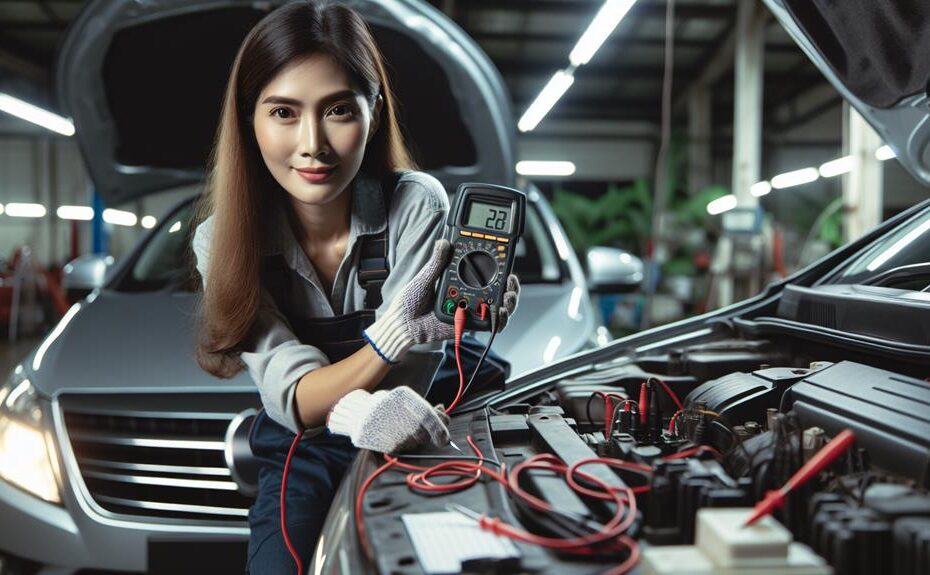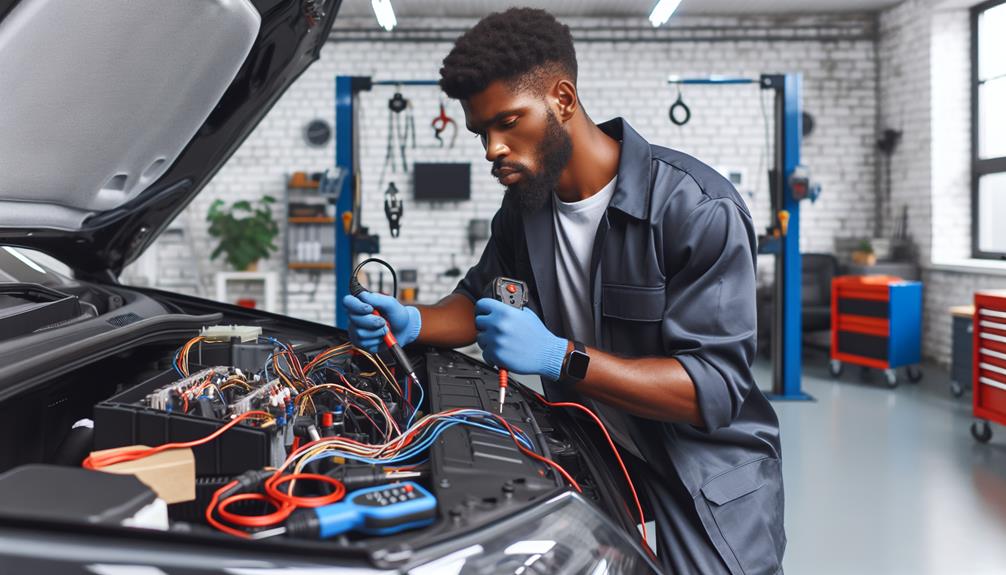Imagine cruising down the open road, the wind in your hair, and the sun shining through the windows of your car.
Suddenly, a strange noise interrupts your peaceful drive, and your heart sinks as you realize there might be an issue with your car's electrical system.
But fear not, for there are five effective ways to avoid such inconveniences.
These simple yet crucial steps will not only keep your car running smoothly but also save you from unnecessary headaches and costly repairs.
So, buckle up and get ready to discover the secrets of maintaining a healthy car electrical system.
Key Takeaways
- Regularly inspect and clean battery connections to prevent corrosion.
- Avoid overloading the electrical system by limiting the use of high-powered accessories and managing electrical demands.
- Invest in high-quality electrical components for enhanced performance and reliability.
- Protect electrical components from moisture and corrosion by regularly inspecting and cleaning connections, using protective barriers, and avoiding wet conditions.
Regularly Inspect and Clean Battery Connections
To ensure proper functioning of your car's electrical system, it's imperative that you regularly inspect and clean the battery connections. This is a crucial step in battery performance and overall electrical system maintenance.
Over time, battery connections can become corroded due to exposure to moisture and other environmental factors. Corrosion can hinder the flow of electricity, leading to a decrease in battery performance and potential starting issues.
To inspect and clean the battery connections, begin by disconnecting the negative cable followed by the positive cable. Inspect the battery terminals for any signs of corrosion, such as a white or greenish powdery substance. If corrosion is present, it's essential to remove it carefully. Start by using a wire brush or battery terminal cleaner to scrub away the corrosion. Be sure to remove any debris or loose particles.
Once the terminals are clean, reattach the positive cable followed by the negative cable. Ensure that the connections are secure and tight, as loose connections can also affect battery performance. It's recommended to perform this inspection and cleaning process every six months or as needed.
Avoid Overloading the Electrical System
Overloading the electrical system in your car can have detrimental effects on its performance and potentially lead to costly repairs. To prevent power surges and manage electrical loads effectively, it's essential to understand the capacity of your car's electrical system and make sure not to exceed it.
One way to avoid overloading the electrical system is to be mindful of the electrical accessories you use in your car. Adding too many high-powered accessories simultaneously, such as multiple phone chargers or high-wattage audio systems, can strain the electrical system. It's crucial to prioritize and limit the use of such accessories to prevent overloading.
Additionally, it's essential to be aware of the electrical demands of different components in your car. For example, using the air conditioning, headlights, and windshield wipers simultaneously can put a significant load on the electrical system. Managing the use of these components and avoiding simultaneous operation can help prevent overloading.
Regular maintenance of your car's electrical system is also crucial in avoiding overloading. Faulty wiring or damaged components can cause power surges and overload the system. Regularly inspecting and promptly repairing any issues can help prevent overloading and potential damage.
Use High-Quality Electrical Components
When it comes to preventing overloading and ensuring optimal performance of your car's electrical system, it is crucial to prioritize the use of high-quality electrical components. Investing in reliable components not only improves the overall functionality of your vehicle but also minimizes the risk of system failures and malfunctions. Two key aspects to consider when selecting electrical components are proper grounding techniques and the importance of voltage regulation.
Proper grounding techniques are essential for maintaining a stable electrical system. Grounding provides a safe pathway for excess electrical current to flow into the ground, preventing damage to sensitive components and reducing the risk of electrical shock. High-quality electrical components are designed with effective grounding mechanisms, ensuring a reliable and secure connection.
Voltage regulation is another critical factor to consider. Fluctuations in voltage can lead to various issues, including damage to electrical components, inconsistent performance, and even fires. High-quality electrical components incorporate advanced voltage regulation mechanisms to maintain a stable and controlled flow of electricity. This ensures that your car's electrical system operates efficiently without any undue strain or risk.
To help you understand the importance of using high-quality electrical components, here is a table highlighting the benefits:
| Benefits of High-Quality Electrical Components |
|---|
| Enhanced performance and reliability |
| Reduced risk of system failures |
| Improved safety and protection |
Properly Maintain and Replace Worn-Out Fuses
Proper maintenance and timely replacement of worn-out fuses is crucial for ensuring the smooth and efficient operation of your car's electrical system. Fuses are essential components that protect your vehicle's electrical circuits from any potential damage caused by excessive current flow. Neglecting fuse maintenance can lead to various electrical issues and even pose a risk of fire.
To avoid such problems, follow these three important tips:
- Regularly inspect your fuses: Take the time to visually inspect your car's fuses to identify any signs of wear or damage. Look for signs of discoloration, melted plastic, or a broken filament inside the fuse. Any of these indicate that the fuse needs to be replaced immediately.
- Use the correct fuse rating: When replacing a fuse, it's crucial to use the correct rating. Each electrical circuit in your car requires a specific fuse rating to operate safely and efficiently. Using a fuse with a higher rating can cause damage to the circuit, while a lower rating may result in frequent fuse blowouts.
- Keep spare fuses on hand: It's always wise to keep a selection of spare fuses in your car's glove compartment. This ensures that you're prepared for any unexpected fuse failures and can quickly replace them on the spot.
Protect Electrical Components From Moisture and Corrosion
To effectively protect your car's electrical components from moisture and corrosion, proper care and maintenance are essential. Moisture can seep into electrical connections and cause damage, while corrosion can weaken wires and lead to electrical failures. Thankfully, there are several moisture prevention techniques and corrosion protection methods that you can employ to safeguard your car's electrical system.
One effective moisture prevention technique is to regularly inspect and clean all electrical connections. Check for any signs of moisture or corrosion, and use a dry cloth or brush to remove any dirt or debris. Applying a moisture-resistant dielectric grease to the connections can also help create a protective barrier against moisture.
Another important step is to keep your car dry and avoid parking in areas prone to flooding or excessive moisture. If you do encounter wet conditions, make sure to dry off any exposed electrical components as soon as possible.
To protect against corrosion, you can apply a corrosion inhibitor spray or coating to vulnerable areas such as battery terminals and exposed wires. This will help prevent the formation of corrosion and prolong the lifespan of your electrical components.
Regular maintenance and inspections are key to ensuring the longevity of your car's electrical system. By implementing these moisture prevention techniques and corrosion protection methods, you can minimize the risk of electrical issues and keep your car running smoothly.
Frequently Asked Questions
What Are the Signs That Indicate Worn-Out Fuses in a Car's Electrical System?
If you're troubleshooting electrical issues in your car, signs of worn-out fuses include blown out lights, malfunctioning power windows, or a dead radio. In such cases, car fuse replacement may be necessary.
How Often Should Battery Connections Be Inspected and Cleaned to Prevent Issues?
You should inspect and clean your battery connections regularly to prevent issues. Battery maintenance frequency is important to ensure the proper functioning of your car's electrical system. Regular electrical system inspections are crucial.
Can Using Low-Quality Electrical Components Damage the Car's Electrical System?
Using low-quality electrical components can potentially damage your car's electrical system. It is important to regularly inspect and maintain your car's electrical system to prevent any issues. Aftermarket components may have negative effects.
What Are the Common Causes of Electrical System Overload in Cars?
Common causes of car electrical system overload include faulty wiring, a malfunctioning alternator, and excessive use of electrical accessories. Troubleshooting these problems requires inspecting the components, repairing or replacing faulty parts, and reducing the load on the system.
What Are Some Effective Methods to Protect Electrical Components From Moisture and Corrosion?
To prevent corrosion and protect your car's electrical components from moisture, there are effective methods you can use. These techniques include applying dielectric grease, using waterproof connectors, and keeping your car dry and clean.
Conclusion
By following these five effective strategies, you can ensure a smooth and hassle-free experience with your car's electrical system.
Regularly inspecting and cleaning battery connections, avoiding overloading, using high-quality components, maintaining and replacing fuses, and protecting against moisture and corrosion will keep your car running like a well-oiled machine.
Immerse yourself in a worry-free drive, where the electrical system hums in perfect harmony, powering your journey with precision and reliability.



